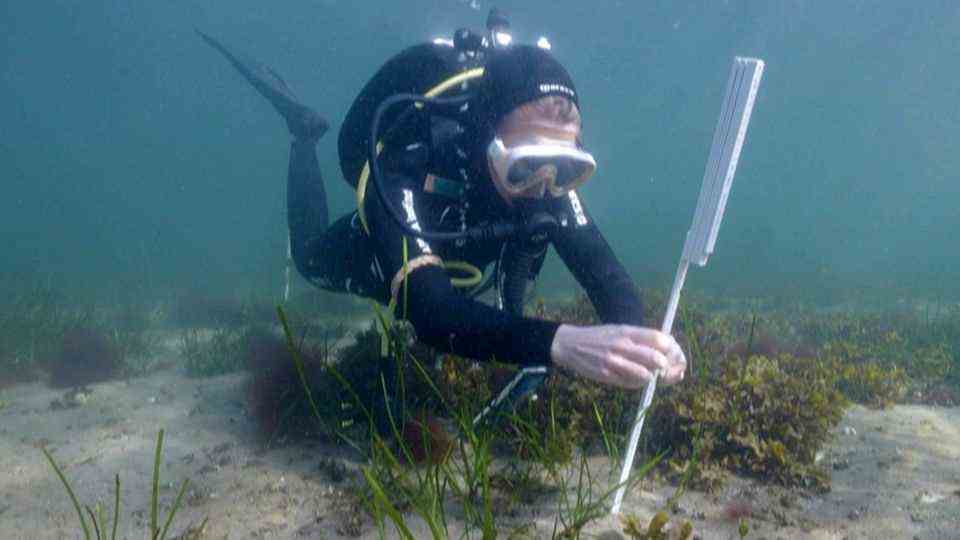IPPC report
Data leak is supposed to show how states want to gloss over the IPCC report
According to the reports, government representatives are said to have asked the panel of experts to reformulate or even delete certain passages of text (symbol image)
© Patrick Pleul / DPA
The report of the Intergovernmental Panel on Climate Change (IPCC) is considered a political benchmark in the fight against climate change. Thousands of documents are now supposed to show industrial nations trying to influence the panel of experts.
Shortly before the beginning of the 26th UN Climate Change Conference in Glasgow, a data leak will show how individual states are lobbying against the world’s most important climate report. The evaluation of thousands of documents by the BBC and “Unearthed”, an investigative team operated by the British Greenpeace offshoot, are intended to prove the attempted influence on the team of scientific experts. As a result, states whose prosperity is based in particular on fossil fuels and meat production have tried to gloss over the IPCC evaluation report, which is due to appear in 2022.
The IPCC (Intergovernmental Panel on Climate Change) is an independent expert body of the United Nations that regularly informs political decision-makers about the progression of climate change, its effects and potential countermeasures. The IPCC experts do not conduct their own research, but summarize the scientific status quo every six to seven years for the 195 member states. “The IPCC reports are neutral, policy-relevant, but not policy-determining.” On the basis of the results, governments decide which measures are necessary to combat global warming.
The countries are free to submit comments and recommendations in advance – but the Intergovernmental Panel on Climate Change does not have to include these in its reports. The BBC and “Unearthed” refer to the majority of the thousands of comments leaked as “constructive”. Nevertheless, the more than 32,000 documents would give an insight into the manipulation attempts of several industrial nations.
Reluctance to the end of fossil fuels
According to the BBC, some countries and organizations are demanding that global CO2 consumption should not be reduced as quickly as the current draft report recommends. For example, an advisor to the Saudi oil ministry called for “wording such as ‘the need for urgent and accelerated measures to curb climate change at all levels’ to be removed from the report”. A senior Australian government official is also opposed to the assumption that all coal-fired power plants need to be closed. Saudi Arabia is the third largest oil producer in the world, Australia is one of the largest exporters of cabbagee.

Downplaying meat as a driver of emissions
The current draft report, according to the BBC and “Unearthed”, concludes that the shutdown of meat production would make a significant contribution to reducing greenhouse gas emissions. According to the data leak, this is contradicted by Brazil and Argentina, which are among the largest meat producers in the world. Both countries urged the IPPC authors to delete passages stating that plant-based nutrition played an important role in the fight against climate change. In addition, the panel of experts should not describe beef as a “high carbon” food. Also the reference to the international campaign “Meatless Monday” would have to be removed from the report if it goes to Argentina. Instead, “generalizations about the effects of a meat-based diet on low-carbon options” should be avoided altogether.
Eating better for the climate: these five nations show how it’s done
5 pictures
Climate finance for poorer countries
According to the IPCC draft, poorer countries in particular need massive financial support in order to achieve the climate targets. This was agreed in 2009that industrialized nations will provide developing countries with 100 billion US dollars for this from 2020 – per year. This goal has so far been missed.
According to the data leak, Switzerland wants to delete relevant passages from the report. “Although climate finance is an important instrument for increasing climate ambitions, it is not the only relevant instrument,” the Swiss Federal Office told the BBC. Australia would come to a similar conclusion. Achieving the climate goals in poorer countries does not depend on financial support alone.
Nuclear power, yes please?
Several Eastern European countries have urged the IPCC to paint a more positive picture of nuclear energy in achieving the UN climate goals. India, according to the leaked documents, even states that “almost all chapters contain a bias against nuclear energy”. Nuclear power is an “established technology” which, with few exceptions, enjoys political backing.
“Absolutely no pressure on the scientists”
Of course, the IPCC does not have to comply with any of these state lobbying demands. After all, the comments should be scientifically verifiable. It is even important that all member states can make comments, Corinne Le Quéré, one of the world’s leading climate researchers, admitted to the BBC. But there is “absolutely no pressure on the scientists to accept the comments.” “Our processes are designed in such a way that they protect against lobbying – from all sides,” declared the IPCC.

